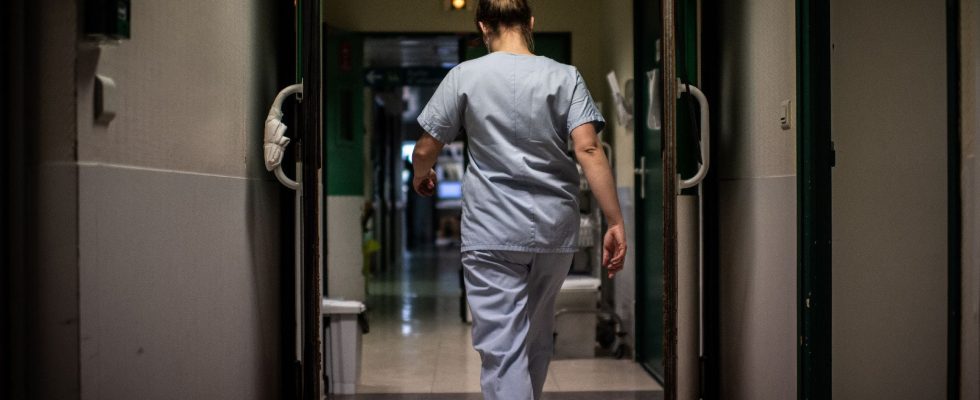The public debt gives Bercy chills. Will that of health have the same effect on avenue de Ségur? In its barometer produced in partnership with FranceInfo and published this Monday, March 18, the French Hospital Federation (FHF) takes inventory of the delays accumulated in the treatment of numerous pathologies. With a clearly identified breaking point: the Covid-19 health crisis which caused the number of hospital stays to drop from 15.9 million in 2019 to 13.9 million in 2020.
“Covid has deconstructed medical organizations,” confirms Parisian François Salachas, neurologist at the Pitié-Salpêtrière hospital in Paris. Problem: these delays in treatment, which according to the FHF “have not been eliminated”, result in the multiplication of late diagnoses. For our colleagues from Parisianthe mayor of Reims, and director of the French Hospital Federation, Arnaud Robinet illustrates: if a “patient with type 2 diabetes” does not have a treating doctor, the latter “risks seeing his case worsen to the point of requiring amputation of the foot.
Late diagnoses
Thus, while worrying about the insufficient care of “diabetics over 35 years old”, the FHF is sounding the alarm about the delay in the detection of certain cancers. “Monitoring cancer in the city becomes an obstacle course, and the chances of survival decrease due to lack of good care,” warns the spokesperson for France Assos Santé, Catherine Simonin interviewed by The Parisian.
But according to the results of the barometer published on the website of FranceInfo, patients with other pathologies are not better off. Since 2019, consultations have decreased by 11% for digestive diseases, by 12% for rheumatological conditions, and by 13% for cardiovascular diseases. In total, more than 3.5 million stays have been canceled or postponed over the past five years.
Medical deserts and financial insecurity
A phenomenon which can be explained as much by the situation of tension experienced by the public hospital, as by the refusal of certain patients to seek treatment. And the observation is “progressing in a worrying manner”, worries the president of the French Hospital Federation. According to the association which brings together most French public health establishments, more than 60% of French people have already given up at least one healthcare procedure over the last five years.
Difficulty accessing health services accentuated by economic and material insecurity. According to the FHF, four out of ten French people have given up on seeking treatment due to financial difficulties. “Having mutual insurance is becoming a very heavy burden for many people,” confirms our colleagues at Parisian Philippe Froguel, diabetologist and endocrinologist at Lille University Hospital. This is why 13% of people surveyed by the Ipsos institute as part of the barometer prefer to go to the emergency room rather than advance the costs of a consultation.
Waiting time doubled in five years
The shortage of medical supplies, particularly in rural areas, is also highlighted by the French Hospital Federation as one of the components of the “health debt”. We are talking in particular about “medical deserts”, these geographical areas devoid of medical-social services. A scourge which would affect between 9% and 12% of the French population – or between 6 and 8 million people – according to a senatorial report drawn up in January 2020.
For rural people, “the time to access care generally remains 52% higher than that of urban residents”, underlines the Ipsos opinion poll carried out for the FHF. Thus, a person living outside a large city will wait twice as long as a city dweller to obtain an appointment with the ENT, for example. And for a consultation in a maternity ward, the difference is around a third.
Emergencies on the front line
However, it is clear that the shortage of health services does not only concern rural areas. According to the barometer, five out of ten French people have given up on seeking treatment because of the waiting time to make an appointment. Across the entire territory this would have almost doubled in five years. And this, “on the majority of specialties”, underlines the French Hospital Federation. A waiting time which pushes more and more French people to go to the emergency room.
Among them, 30% say they have not found an appointment with a general practitioner or specialist within an acceptable time frame. In addition, almost one in two people surveyed favored the choice of proximity: the hospital emergency rooms would be closer to their home than the nearest medical office. This observation is all the more worrying as hospitals are struggling to manage the influx of patients in their emergency departments. Last year, the LR deputy for Hauts-de-Seine Philippe Juvin, also head of emergencies at the Georges Pompidou hospital in Paris, challenged public opinion by revealing that 100 to 150 people had died on a stretcher in the French hospitals, over one month, due to lack of care”. Figures taken from Samu-Urgence France, an emergency medicine union.
More recently, Gilles Pialoux, head of the infectious and tropical diseases department at Tenon hospital in Paris, alerted in L’Express to the phenomenon of “traffic jam” within the emergency room which gave rise to the “stretcher patient”. These patients who consulted emergency departments, whose “medical care in the emergency room has ended and who are waiting, often in precarious conditions, for a bed to become available”, explains the professor who recalls the data highlighted by a recent study: “A night spent on a stretcher increases the risk of mortality in elderly patients by 40%.”
